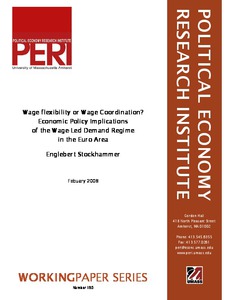Wage flexibility or wage coordination? Economic policy implications of the wage-led demand regime in the euro area
"Wage shares have fallen substantially in Europe since the early 1980s. To some extent this is due to a macroeconomic policy package that encourages wage flexibility and wage competition. A system of wage coordination in the Euro area would facility a return to a productivity-oriented wage poli...
| Main Author: | |
|---|---|
| Institution: | ETUI-European Trade Union Institute |
| Format: | TEXT |
| Language: | English |
| Published: |
Amherst
2008
University of Massachusetts |
| Subjects: | |
| Online Access: | https://www.labourline.org/KENTIKA-19189499124919076719-Wage-flexibility-or-wage-coord.htm |
| Summary: | "Wage shares have fallen substantially in Europe since the early 1980s. To some extent this is due to a macroeconomic policy package that encourages wage flexibility and wage competition. A system of wage coordination in the Euro area would facility a return to a productivity-oriented wage policy by reducing wage competition. In a recent study on the demand effects of changes in functional income distribution Stockhammer, Onaran und Ederer (2007) find that the Euro area is in a wage-led demand regime. According to their results a reduction of the wage share by 1%-point leads to a reduction of demand by around 0.2%-points of GDP. This finding has far reaching implications for economic policy. A stable wage share would help stabilize demand. The paper aims, first, at clarifying some conceptual issues in the design of a European system of productivity-oriented wage coordination and, second, it discusses the economic policy implications of wage coordination. The present policy package assigns wages the role of a shock absorber. However, as wage reductions do have negative demand effects in a wage-led demand regime, this policy has a deflationary bias. A system of wage coordination will thus have to be complemented by a more active nation fiscal policies and more fiscal redistribution within the EU. If so a regime of productivity oriented wage coordination will help to stabilize demand and it is consistent with price stability." |
|---|---|
| Physical Description: | 13 p. Digital |

